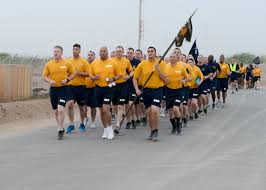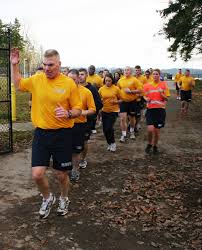
My May 2017 and June 2017 blogs both spoke of the importance of a leader maintaining an optimistic demeanor. Given its importance, is there something a leader can do to stay optimistic, especially when one hits a rough patch?
There is. It’s exercise.
There are many things I loved about the military, and one of them is the well-established requirement to maintain one’s physical fitness – staying fit is an extremely important aspect of being in the military. The requirement to meet physical fitness standards begins from day one of your military career.
Optimism came easier to me when I exercised.
Part of the lengthy process to join the U.S. Armed Forces is completion of a thorough physical examination. When I began the process to join the military all those years ago, I had no concerns about passing the physical exam. I had always been physically active and played a number of sports. When I stepped on the scale in the recruiting station and found that I was 20 pounds overweight, I was shocked. I realized that I had gotten away from working out and my physical inactivity had caught up with me.
The bottom line was that I needed to lose the 20 pounds in order to get in the Navy. I vowed to lose it as soon as possible, and also vowed to never get so out of shape again. Over the next few weeks, I worked extremely hard – running, lifting weights, eating healthy – and lost the weight. After an auspicious start, my Navy adventure began.
More importantly, I kept my vow to stay in good physical condition. While I certainly had days when I didn’t get a chance to exercise, I maintained a regular schedule of physical fitness throughout my 30-year career. I noticed that exercise helped keep me upbeat and positive. I also was able to find clarity on complex issues during a good work out. This all helped me stay optimistic, especially when things got tough.  Knowing all this, no matter how taxing the job – and carving out time to workout became much more challenging during the last 10 years of my career – my commitment to maintain an exercise routine never wavered.
Knowing all this, no matter how taxing the job – and carving out time to workout became much more challenging during the last 10 years of my career – my commitment to maintain an exercise routine never wavered.
While I know my physical fitness routine was instrumental in helping me maintain a more upbeat and optimistic demeanor, are their studies that show that to be the case?
In fact, there are. Studies have shown that exercise boosts cognition, as well as the release of neurotransmitters that are similar to those released by antidepressants. In other words, a good workout and antidepressant medications produce similar neurotransmitters. Apparently, there actually is something to the runners high! Another example are studies that show how a small change in diet and increased physical activities help in the prevention and treatment of type-II diabetes.
Throughout my Navy career, I always made an effort to remain physically fit. Did I find excuses not to work out? Absolutely. Fatigue and a hectic schedule were the most common. I learned from others a few tricks to get moving. Take 10 minutes to go for a walk. Use the stairs instead of the elevator. If you travel a lot, bring a deck of cards and do a deck of cards workout in your hotel room – they’re great work outs and you can knock one out in 20 minutes. Simply make a commitment to get moving.
During those times when I missed my exercise routine because of the overwhelming burden of work, I found it much more difficult to remain upbeat. Optimism came easier to me when I exercised.

Be a great leader. Get after it – commit to physical exercise. You’ll find optimism much easier to come by and you’ll be a more effective leader for the effort.